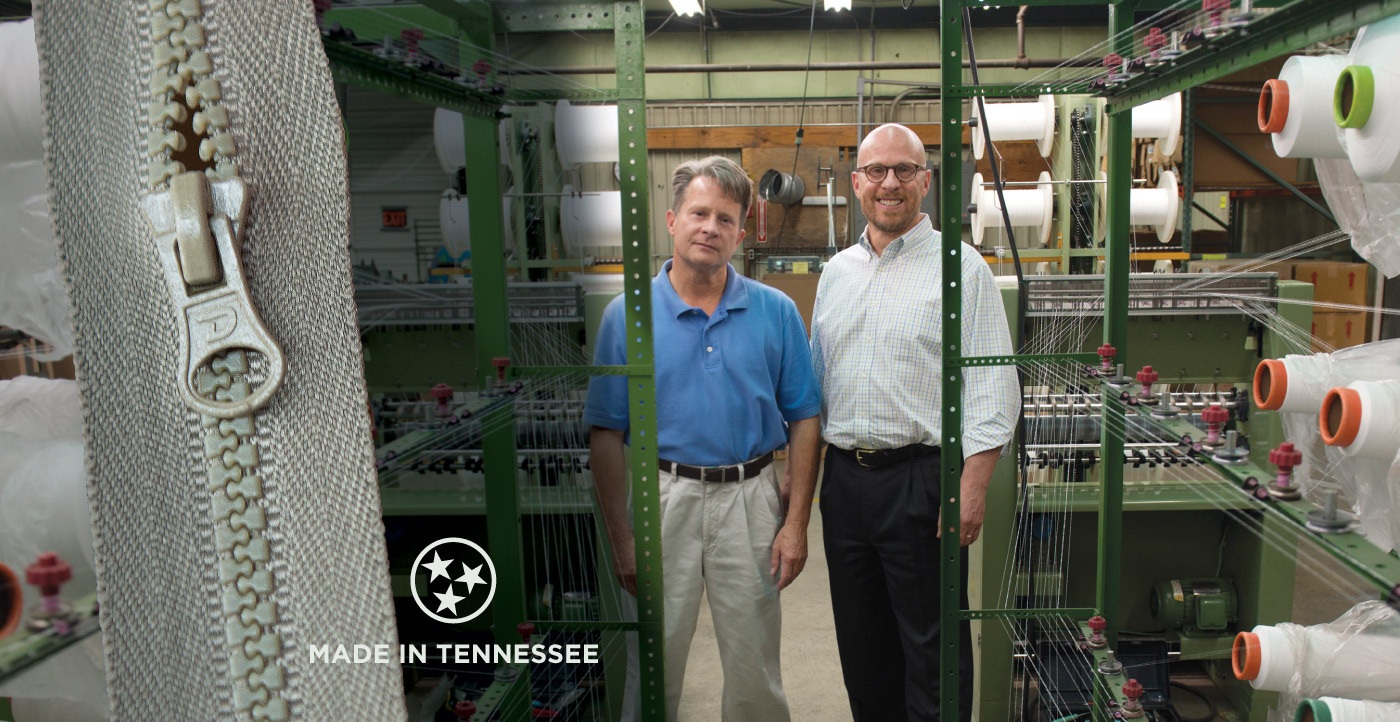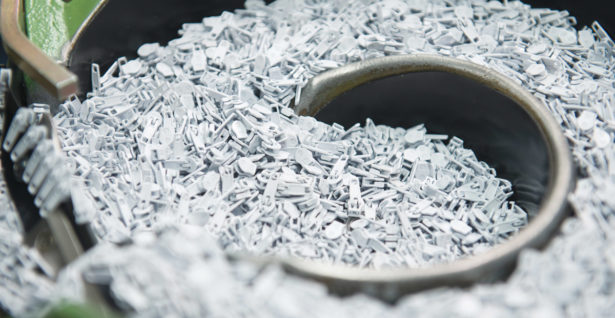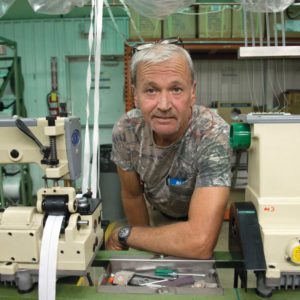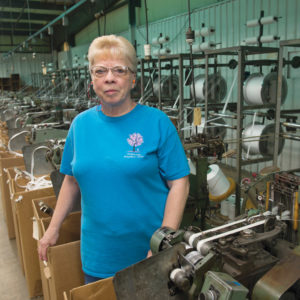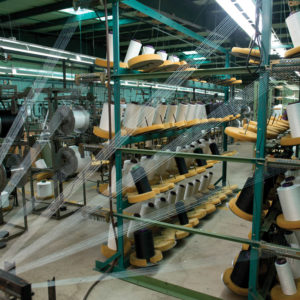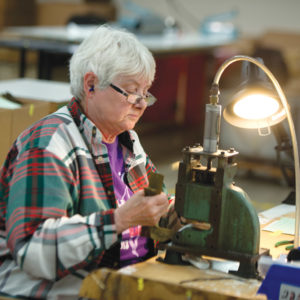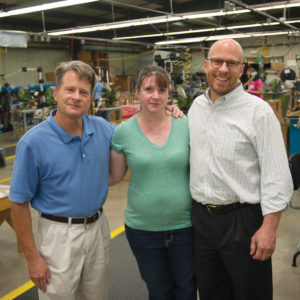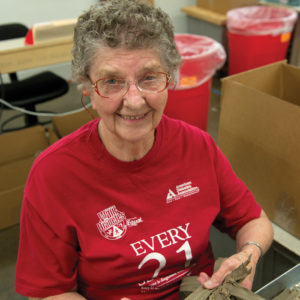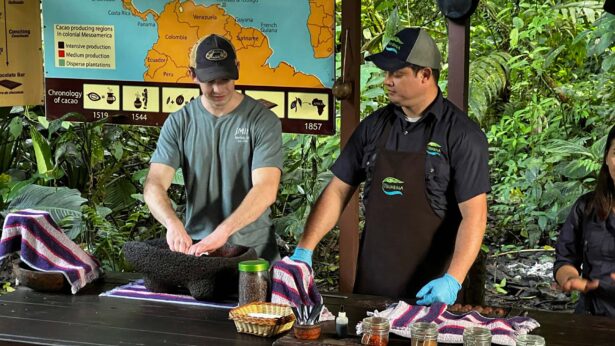By Jennifer Sicking Photos by David Humber
Robert Kwasnik admits that, when he tells people what he does, he doesn’t always receive a warm response.
“It can end a conversation pretty quickly when I say I make zippers,” says the president of Dunlap Industries. “But I can continue a conversation by saying, ‘Have you tried to get through a day without zippers?’”
Video by UTC TV Studio
Dunlap Industries takes its name from the town of Dunlap, Tennessee, population: 4,873. The company and the town with its almost 5,000 residents make their home in Sequatchie County, one of a handful of rural counties in the Sequatchie Valley, a 125-mile gash in the Southeast Tennessee landscape.
For 50 years, Dunlap Industries has served as a testament to a partnership between the University of Tennessee, the Tennessee Valley Authority and Dunlap residents as 80-plus employees crank out zippers used in military uniforms, clothing, furniture and more.
In that landscape marked by dramatic vistas and deep gorges, UT students found Tennessee’s highest unemployment rate in 1965.
The UT Department of Industrial Engineering and the TVA’s Tributary Area Development wanted to try a new approach to industrial development called bootstrapping. The idea centered on a community’s people combining individuals’ financial resources to establish a business. To test the concept, they looked for an economically struggling rural county.
In Dunlap—with fewer than 1,500 residents in 1965—they found one, along with community leaders who wanted to bring another factory to town in case the only existing one, which made shirts, went out of business.
In response to that, the UT students conducted another study to identify a viable industry for this town situated between Walden Ridge and the Cumberland Plateau.
The research found that, while the sewn manufacturing industry had followed labor south, trim, including such things as zippers, had not. The study concluded by recommending the town of Dunlap start a zipper factory, and the idea quickly gained traction. Local doctors, coal and stone quarry owners, car salesmen and others stepped forward to invest 95 percent of the money needed to start the zipper factory.
Mike Kwasnik Sr., then a UT-Knoxville MBA student, contributed to the study even as he worked in nearby Chattanooga. Encouraged by his academic advisor, he applied for the manager’s position and was one of three employees on the payroll when the factory opened in 1966. The following year, he was named a director of the fledgling company and became president in 1968. The factory gradually added employees and, by 1969, had 20.
“He made a decision to try it,” Mike Kwasnik Jr., vice president of Dunlap Industries, says of his father, who died in 2014. “From doing the study, he felt like this would work.”
For 50 years, it has.
Even through the lean times, when Kwasnik Sr. and his wife took out personal loans to meet payroll, and the flush times when multiple shifts worked to keep up with demand, the bootstrap idea has paid off. Of the 80-plus zipper factories that operated in the United States in the 60s, Dunlap Industries is one of only three remaining and the only one in Tennessee today.
“Failure was not an option. He would do whatever it took to make it work,” Kwasnik Jr. says. “He definitely was not going to give up.”
As the industry flexed and changed, with sewn-product manufacturers from clothing to handbags and luggage moving operations to foreign climes, the trims had to change, too.
“You either had to adjust to that or go out of business,” Robert Kwasnik says. “Most went out of business.”
Even as Dunlap Industries established partnerships overseas, Robert Kwasnik and his brother, Mike Kwasnik Jr., never forgot Dunlap’s legacy of providing jobs for local employees. They have carried that with them since joining the company 30 years ago.
“Dad made us promise to take care of employees here first,” Kwasnik Jr. says. “We see what we can do to produce the product here first.”
And, in doing so, they’ve sometimes played a role in pop culture.
The company manufactured the zippers for the iconic cover for the 1971 Rolling Stones album “Sticky Fingers,” which sold millions of copies.
When the Kellogg Company needed zippers for a paper jacket given away to commemorate the 1992 Olympic Games and the U.S. basketball “Dream Team,” the cereal giant turned to Dunlap.
In 2001, Columbia Pictures asked Dunlap for metal zippers to make the sweat suit jacket look authentic after “Ali” star Will Smith noticed the anachronistic plastic zippers.
The company also made the zippers for a 2004 Serena Williams-designed Nike outfit that featured a sparkly, silver-coated zipper.
It has found other ways to help customers—including the non-famous—from changing the coil synthetic zipper design to help furniture manufacturers to changing a design to help the U.S. military.
“We may never be the biggest zipper company in the world, but we are the best,” Kwasnik Jr. says.
Through the years, the company has stayed connected to UT. It worked with the UT Chattanooga MBA program to research the marketability of a Dunlap patent. The Center for Industrial Services, an agency of the UT Institute for Public Service, trained employees in lean manufacturing, which strives to eliminate waste and overburdening employees. That training resulted in doubled production and winning a large government contract.
Yet, Robert Kwasnik acknowledges, zipper production still requires the human element: “Every zipper is touched by human hands.”
It’s in those hands that the factory found profit. In 50 years in business, Dunlap Industries’ original stockholders have averaged an annual return of 4.9 percent on their investment. The company has generated sales of $388 million and returned to the Dunlap economy more than $100 million in payroll, building rent, taxes and loan interest.
“To the day that he passed, he’d say his success was due to the people of Dunlap,” Kwasnik Jr. says of his father.
In the factory, machines hum as they weave threads into the fabric tape –the pieces of material on either size of the zipper’s teeth. Ann Hobbs, one of 80-plus employees, moves among machines weaving thread into tape that provides the zipper base. She began working for Dunlap 45 years ago after the local shirt factory where she worked closed.
“I liked it here, and I stayed,” she says of her years with the factory while pausing from counting 3,000 yards of the tape to be sent to Taiwan.
More than 19 percent of the factory’s employees have been on the payroll 30 years or more. The Kwasnik brothers say the percentage would be higher, but many of the original workers have begun to retire. For those with more than 20 years with the company, the number reaches 58 percent.
Geneva Burch has been clocking in at the factory for about 30 years.
“I’ve not been here the longest, but I’m the oldest,” says the 82-year-old as she counted zippers bound for San Antonio, Texas. “This job is what keeps me going. It keeps me from being lazy.”
Randall Summers joined the company after graduating from high school 32 years ago. He likes that he doesn’t have to travel to Chattanooga to work.
“Most people live here in town and shop here in town,” he says while sewing raw coil of zippers to two pieces of flat tape. “The money stays here. That helps the whole town.”
Dunlap Mayor Dwain Land agrees.
“It’s always been an anchor, a rock-solid business in the city,” Land says. “It takes care of 85 families in the town.”
The wallet plays an important part in the economic development of both the town of Dunlap and the zipper factory. When people buy items made outside the United States solely for a cheaper price, they’re voting with their wallets to send jobs overseas, Robert Kwasnik says.
“An absolute, positive consequence is if you go in and demand American products, then our jobs would come back,” he says.
For now, the zipper factory continues to hum along, hiring employees and adding a second shift as workers fill one 40-foot shipping container every two days. Land says the city’s Industrial Development Board is working to help the company expand to a third building so the factory can continue to grow.
The commitment from the past remains an investment in the future for the town and people who work at Dunlap Industries.
“In celebrating our 50th year, we’re celebrating the private and public partnership that started us in this business,” Robert Kwasnik says. “We create a product that makes a difference in people’s lives.”
Those people can be customers, employees or others. And, through that difference, sometimes conversations don’t end when talk turns to zippers. Sometimes it invites others to join in.
Kwasnik Jr. found once that the mention of zippers didn’t end a conversation. It started one.
As he settled into his airplane seat for the flight back to Chattanooga after a business trip, he struck up a conversation with his seatmate, mentioning that he works for a company that makes zippers in Dunlap, Tennessee. A nearby woman joined the conversation, saying she was from Dunlap. Another woman chimed in to say her aunt worked at the factory. A soldier announced the zipper on his fatigues came from Dunlap.
Then began the chant: “Dunlap! Dunlap!”
